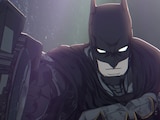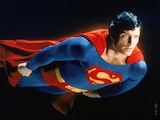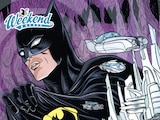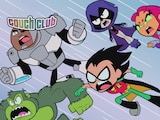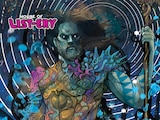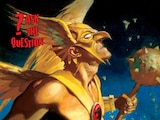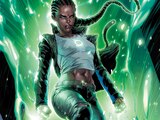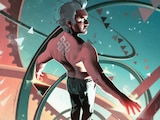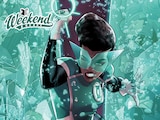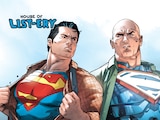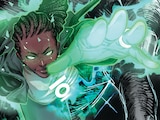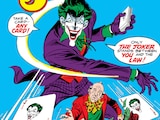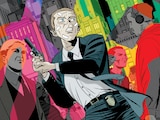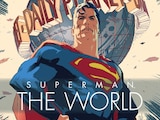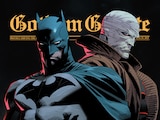To celebrate Asian American and Pacific Islander Heritage Month, we’re shining the spotlight on a few of the talented AAPI writers and artists working for DC today. This week, we talk to Gene Luen Yang, an award-winning cartoonist distinguished for graphic novels including American Born Chinese, Boxers and Saints, and Dragon Hoops; and a writer well-known to DC fans for New Super-Man, Superman Smashes the Klan and his current run on Batman/Superman.
Culture and identity have long inspired Gene Luen Yang’s creative output. His breakthrough work was the graphic novel American Born Chinese, published by First Second Books—an Eisner Award-winning story that synthesized the Chinese mythological character the Monkey King with the struggle of a modern-day immigrants’ son to fit into white American culture. At DC, Yang has brought a similarly thoughtful perspective to works like New Super-Man, about a high school student from Shanghai with similar powers to the Man of Steel, and Superman Smashes the Klan, the story of a Chinese American family targeted when the Ku Klux Klan comes to Metropolis.
Yang’s latest DC co-creation is the Monkey Prince, a new superhero introduced in the recently released DC Festival of Heroes: The Asian Superhero Celebration anthology one-shot. The Monkey Prince, co-created by artist Bernard Chang, is the son of the legendary Monkey King, and goes to Fawcett High alongside Billy Batson…and happens to have a superpowered rivalry with Shazam.
We talked in-depth last week with Yang about the Monkey Prince—the character’s development, debut and future—but of course, there was plenty more to discuss. This year’s Asian American and Pacific Islander Heritage Month comes after more than a year of unprecedented violence and xenophobia against Asian Americans, something that Yang approached head-on this past March in a comic strip titled #AsiansAreHuman, expressing his anguish over tragic recent events and the frustration that true progress has remained elusive.
As part of DC’s recognition of AAPI Heritage Month, we talked with Yang about the historical significance of DC Festival of Heroes, what it means to him to be the monthly writer of current DC series Batman/Superman, what type of room there is still to grow for Asian Americans in comics and his mindset following this undeniably difficult past year.

Art by Viktor Bogdanovic
Gene, for you as both an Asian American comics creator and a comic book fan, what does it mean to you to see a book like DC Festival of Heroes? In the past it’s felt like Asian Americans throughout entertainment just haven’t been, for lack of a better term, valued enough to get something like this. How does it feel to not only see this happen, but to contribute an important piece to the anthology?
I think I feel the same way. I think it’s something that I wouldn’t have been able to imagine, even five years ago. The fact that Jessica Chen, the editor who dreamed this up, was able to push it through, says a lot.
On a gut level, it’s this feeling of affirmation. I’ve been a comic book fan for a really long time. I think in the very beginning, in the ‘80s, it just felt like we were completely invisible. To be frank, I think as a kid, I probably preferred it that way. I went through a period of time when I was ashamed. I didn’t want to be Asian. There was no way I would pick up a comic with an Asian character in it because I didn’t want anything to highlight the fact that I was different.
In college, after I worked through some of that, I remember going to the comic book store and buying the Cassandra Cain Batgirl comics when they were coming out, specifically because she was an Asian American. At that point, I realized there were a number of us behind the scenes, but it was just very rare for us to be on the page. This feels like a real turning point, where we’re both behind the scenes and also on the page.
The other thing about mainstream comics, especially in the ‘90s, is there were a number of fan-favorite Asian-American artists, but it seemed like writers were rarer. It was Larry Hama by himself, it felt like, for a very long time. (Laughs)

Art by Gurihiru
Given that it is Asian American and Pacific Islander Heritage Month, I also wanted to talk about some real-life social issues, which are hard to ignore this year, especially. The comic you released in March inspired by the #AsiansAreHuman hashtag and recent acts of violence and xenophobia was very powerful. You’re someone who has thought a great deal about these issues over a period of years, and created so much art around issues involving Asian Americans. What has this past year been like for you?
This past year has been especially horrific. But I do feel like over the last five years at least, maybe even a little bit more, it’s been really disheartening. It’s felt like we’ve been moving backwards in some ways. I know that’s not necessarily true, it’s just that these elements that have been maybe a little bit more hidden are starting to come to the surface. But it still gives a feeling of backwards movement to me.
There’s a comedian named Jenny Yang that I really love, and she has this bit where she talks about how Asian Americans have conditional privilege. We have a certain level of privilege, but when stuff hits the fan, it can get pulled away. I feel like that’s exactly what happened.
I did a graphic novel with DC called Superman Smashes the Klan, which is set in the 1940s. The main characters are Chinese Americans. To do that book, I did a lot of research into the 1940s. I think the 1940s were a pivotal moment for Chinese Americans, specifically. In the 1930s, all the stereotypes around Chinese Americans were about how we were criminals, how we were drug addicts. You wouldn’t go to Chinatown for fun, you would go to Chinatown if you wanted to get mugged. Chinese were seen as genetically violent. Then there was this huge turnaround in the 1940s, largely because of World War II, where Chinese were seen as hard-working and loyal. The narrative around us just completely shifted.
I think that narrative shift eventually broadened out to all Asian Americans, and it kind of lulled us into this sense of complacency. I think some of us were tricked into thinking that we didn’t really need to care about the issues that other minority groups needed to care about. To use superhero language, in the 1940s we got invited into the Hall of Justice. But we were invited in as sidekicks. We went from being villains—the villain on the cover of Detective Comics #1, that was what we were—and then we became these sidekicks that were invited into the clubhouse.

Art by Gurihiru
What people like Jenny Yang would argue is that, as a sidekick, your membership card can get revoked at any time. And that’s what we saw over the last year. Our membership card got revoked. We got kicked out of the Hall of Justice and we suddenly became villains again, through no fault of our own. In the 1940s, the reason we had that PR turnaround—Chinese Americans specifically—was Pearl Harbor. After Pearl Harbor, China became America’s greatest ally against the empire of Japan. Chinese Americans therefore became loyal American citizens.
Now, something that we have no control over happens again. A pandemic begins in China and suddenly Chinese people become threats, and by extension, all Asian Americans, because a lot of Americans can’t tell us apart. As an Asian-American storyteller, it’s been on my mind since the beginning of my career. I want to present Asian Americans as three-dimensional because it was so rare when I was a kid. It was so rare for me to encounter an Asian-American character who had real feelings, who had real human motivations. Even instinctually as a kid, it felt dangerous for that to happen. I wanted to distance myself from Long Duk Dong, because it felt dangerous to be around things that were so one-dimensional.
The incident in Atlanta—that was the clearest example of what can happen when you see other human beings as one-dimensional. He wouldn’t have been able to do that had he seen those Asian-American women as three-dimensional human beings with backstories and understandable emotions, flaws and desires, all of that. He wouldn’t have been able to do that.
Every time I feel like, “There are enough stories about us out there,” something happens where I go, “Nope. We’re not done yet.”

Art from DC Festival of Heroes by Bernard Chang
And what an infuriating thing for people to immediately try to remove the element of race from incidents like the killings in Atlanta. There is this subconscious notion of, “Asians have it okay. It’s got to be something else.” On the flipside of that, though, is there any amount of optimism given the increased visibility of these issues among people who may have never thought about them before? Does this recent dialogue mean an opportunity for progress?
Yeah, absolutely. It’s a moment. Atlanta in particular, this entire pandemic in general, it feels similar to the murder of Vincent Chin. I’ve seen the Asian-American community gather in a way I don’t think I’ve seen in my adult years. This feels different than anything that’s happened before. The hope is that something good will result.
You know how President Biden talks about the K-shaped recovery? How rich people are going to be fine after the pandemic and poor people are not. I worry about K-shaped progress, that there’s a segment of society that’s going to grow willfully more ignorant of issues of race.
As we discussed, there has been a lot of historical success in the North American comic book industry for Asian-American artists—Jim Lee is the Chief Creative Officer of DC, after all—but there’s still a lot of room for representation on both sides; behind the scenes and on the page. You succeeded in telling your own stories before also working on shared universe superheroes at companies like DC, so from your perspective, how much room is there to grow?
It’s definitely gotten better. I feel like things are overall trending in the right direction. Even the existence of something like DC Festival of Heroes—even five years ago, I don’t know if I could have imaged something like that existing. It is nice to see that Asian-American creators are becoming more and more able to tell our stories, both in the graphic novel space and in the monthly comics space.
But of course, there needs to be more. I think we need to get to a point where we actually have back issues. We don’t have a ton of back issues with us in it. That back issue bin is still pretty white. (Laughs) It’s like, Black Panther, Black Lightning and a bunch of white guys. We got to get to a point where there are back issue bins with us, as well.

Art by Ivan Reis
And as lead characters—there are plenty of examples of someone like Katana as part of the team in Batman and the Outsiders, but not a lot of comics with Katana in the title.
That’s right. China specifically, Asia in general, is ascending economically. I really think the next century will be defined by the relationship between the east and the west. It can go south really fast, but I do think stories have an important role to play. We have to tell the right stories to promote understanding. If we don’t, it could get rough.
I also wanted to touch on your current run on Batman/Superman. It is, of course, important for Asian creators to write Asian characters, but it’s also important for writers from underrepresent groups to have the opportunity to write any character. There is a significance in seeing an Asian-American creator writing icons like Batman and Superman. What’s it been like for you?
It’s been a ton of fun working on Batman/Superman. I love the creative team that (DC editors) Paul Kaminski and Ben Meares put together. Ivan (Reis) is among the elite of the elite. I think there’s something iconically “DC” about his style. When I close my eyes and imagine the DC Universe, it’s drawn by Ivan. Danny Miki is just phenomenal. The amount of heart that they pour into every page is shocking to me.
I really love the Infinite Frontier era. I think it offers all sorts of really amazing and interesting possibilities. Paul and Ben really just let me run and it’s been amazing. Frank Miller calls Batman and Superman the two characters who have true lasting power and I think that’s really true.
I think as an Asian American, what I bring to it is, I wanted to tell a story about going from one world to another. I don’t talk about race explicitly in the story at all, but I do feel like, as an immigrant’s kid, I did that on a daily basis. Every time I went from my home to school, I was going from Taiwan to America, basically. I think that’s the aesthetic I’m bringing to the story.
Be sure to drop by DCComics.com all throughout May for more AAPI creator interviews. And don't forget to check out Gene Luen Yang and Bernard Chang's story, "The Monkey Prince Hates Superheroes," in DC Festival of Heroes: The Asian Superhero Celebration, now available in stores and as a digital comic book.

